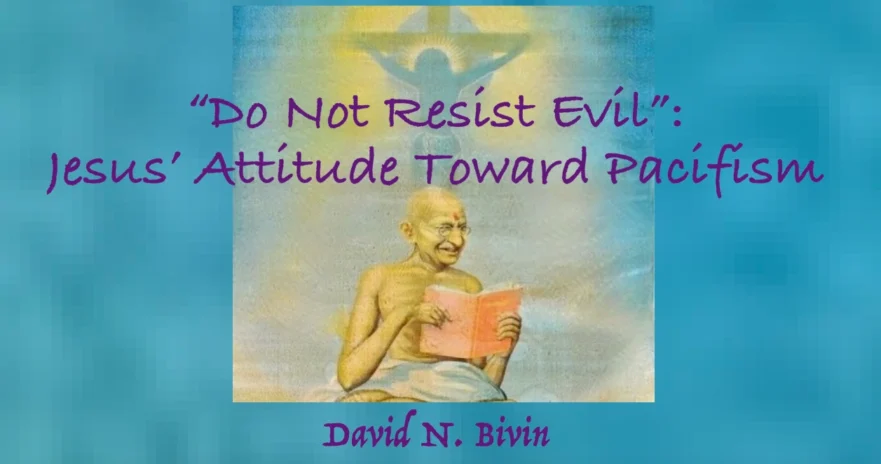How to cite this article: David N. Bivin, “‘Do Not Resist Evil’: Jesus’ Attitude Toward Pacifism,” Jerusalem Perspective 45 (1994): 3-6 [https://www.jerusalemperspective.com/2699/].
Updated: 2 Oct. 2025Many people over the years have seen Jesus as a pacifist—and for good reason. Here was a man who apparently was willing to die rather than defend himself, a man who taught his disciples not to kill, not to resist evil, to love their enemies, not to fear those who kill the body, and that only those who are willing to lose their lives will be able to save them.[1] Jesus’ teachings seem very much like those of such popular pacifists as Tolstoy and Gandhi, and indeed, Tolstoy based his views on Gospel passages.[2]

But did Jesus teach that it is wrong to defend oneself against attack? Did he really mean that we should not resist evil? Such a view seems to contradict what we read elsewhere in the Bible. In Rom. 12:9, for example, Paul says that one should “hate what is evil,” and in James 4:7 we read that we are to “resist the devil.” It is clear from passages in Luke 22 that Jesus’ disciples were armed,[3] and Jesus himself advised them to purchase swords.[4]
Premium Members and Friends of JP must be signed in to view this content.
If you are not a Premium Member or Friend, please consider registering. Prices start at $5/month if paid annually, with other options for monthly and quarterly and more: Sign Up For Premium

When we examine Jesus’ words from a Hebraic-Jewish perspective, we can see what has been obscured by mistranslation and lack of familiarity with Judaism. The passages construed to support pacifism actually condemn revenge rather than self-defense. It is not surprising that this interpretation is consistent with Jesus’ other teachings and the rest of biblical instruction.
Whose Attitude Toward Pacifism?—A Brief Response to David Bivin
by Joshua N. Tilton
Despite my love and appreciation for David Bivin, I regard this article as a poor example of his scholarly abilities. Bivin waves away issues that go to the core of understanding Jesus and his message and is dismissive of deep thinkers and moral leaders like Leo Tolstoy, Mohandas Gandhi, and Martin Luther King, Jr. There are also numerous problems with the arguments Bivin presented in this article, among the most serious being:

- Bivin does not seem to understand that Pacifism is not mainly concerned about the issue of self-defense, but a belief that violence is an immoral means to achieve an end. War, aggression, and coercion are morally intolerable from a pacifist’s point of view, but self-defense is in a grey area. Even Martin Luther King, Jr. carried a gun for self-defense.
- The pacifist viewpoint is not based simply on a handful of verses in the Sermon on the Mount but on Jesus’ moral example throughout his life and his clear rejection of radical Jewish militant ideologies such as those held by the Sicarii and the Zealots.
- Bivin does not successfully make the case that the saying in Ps. 37 and Prov. 24:19 stands behind Matt. 5:39a. The verb in Matt. 5:39a translated “resist” is ἀνθιστάναι (anth·is·TAN·ai), which has the basic meaning of “stand opposed.” It occurs in the Septuagint as the translation of a variety of verbs, but never of the root ח-ר-ה (ḥ-r-h), so it is not clear why Bivin should translate or interpret ἀνθιστάναι in Matt. 5:39a in the light of ח-ר-ה. If ח-ר-ה is not behind ἀνθιστάναι then the supposed allusion to “Do not be vexed by evildoers” evaporates. A better option is to translate ἀνθιστάναι in Matt. 5:39a in light of Matt. 5:39b (“if someone strikes you on the right cheek also turn to him the other”). Here is an illustration of what to do instead of ἀνθιστάναι. If someone strikes you on the right cheek, do not strike them back, but turn your other cheek instead. Hence ἀνθιστάναι (“stand opposed”) in Matt. 5:39a to not “reciprocate” an evil action with an equal and opposite reaction. Not your eye for my eye. Not your tooth for my tooth. Rather I’m willing to absorb the evil and stop the cycle of violence. You strike my right cheek. Very well. I’m not going to reciprocate, I’m going to give my other cheek too, a second opportunity for you to see that I am a human created in the divine image. And this time, perhaps you will repent of your evil deeds instead of beating me into submission.
- Bivin is simply wrong that “pacifism was never part of Jewish belief.” Pacifism, correctly defined, does not have to do with defending oneself or one’s children from an attack, it is a political philosophy that rejects war, aggression, and coercion as justifiable in order to achieve one’s political goals. In the first century there were plenty of Jews who espoused such views. The Sicarii and the Zealots wanted to throw of the Roman yoke through violent rebellion. Herod and his heirs bent their subjects to their will through the use of force. But there were those who felt that violence was not a morally acceptable response to the current political situation. The Essenes and/or the authors of the Dead Sea Scrolls clearly espouse a pacifistic or quietistic ideology. They urged submission to the ruling powers and prohibited defending their persons and property against those who oppressed them. Going further back, there is the example of the Prophet Jeremiah who urged submission to foreign rulers and who was abused and imprisoned for his political views. Going forward in time there were prominent individuals, like Rabban Yohanan ben Zakkai who urged living peaceably under Roman dominion rather than rising up in revolt. And Josephus himself thought that the revolt against Rome was a rejection of God’s will for the Jewish people. Jesus’ pacifism should be evaluated within its political context, not as an individualistic form of piety that rejected self defense against an unprovoked attacker.
- Bivin claims to know “the Jewish position” on the issue of pacifism and cites a passage from the Mishnah, a document composed 150 or so years after the time of Jesus when political circumstances for Jews in the land of Israel had changed drastically. And again, the “dicutm” he cites has to do with self-defense against a murderer, not the political philosophy of pacifism Bivin claims to argue against. A more apt quotation might be דִּינָא דְּמַלְכוּתָא דִּינָא (“The law of the land is the law”) an even later rabbinic decision, but one that at least is pertinent to the case since it recognizes the authority of non-Jewish governments to govern their Jewish populations. In fact there is no such thing as “the Jewish position” on any issue. Judaism is not and has never been a monolith. There are numerous Jewish positions regarding nearly every issue, including issues as close to the heart as the State of Israel.
On account of these difficulties this article should hardly be considered the final word on Jesus’ view of pacifism. On the contrary, it has barely scratched the surface of this complex and fascinating issue. My conclusion is that the title of this article is a misnomer. It should be called “Bivin’s”—not Jesus’—“Attitude Toward Pacifism.”
Here are some more articles that touch on the issue of non-retaliation that you might enjoy:
Notes
- Matt. 5:21, 39a, 44; 10:28; 16:25. ↩
- See Leo Tolstoy, The Kingdom of God Is within You (trans. Constance Garnett; New York, 1894; repr. Lincoln: University of Nebraska Press, 1984). In 1894 Mohandas Karamchand Gandhi, at that time a barrister in South Africa, read The Kingdom of God Is within You, which had been loaned to him by a Quaker. The book “overwhelmed” him, he wrote in his autobiography.
In 1906 Gandhi, struggling against racial prejudice in South Africa, launched a campaign of nonviolent civil disobedience. In 1910 he founded Tolstoy Farm for the families of men who were jailed in the struggle. Later, in India, Gandhi founded other such communities based on Tolstoy’s ideology. In 1920 he launched his program of nonviolent noncooperation with the British rulers of India that led to freedom from British rule. ↩
- Luke 22:38, 49. ↩
- Luke 22:36. ↩










